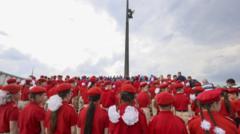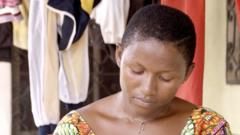Dr. Angela Tabiri, celebrated for her groundbreaking win in The Big Internet Math Off competition, strives to inspire young African women to embrace mathematics and quantum science careers, breaking down stereotypes and providing mentorship through initiatives like the Girls in Mathematical Sciences Programme.
The Maths Queen’s Quantum Quest: Inspiring a New Generation of Female Mathematicians

The Maths Queen’s Quantum Quest: Inspiring a New Generation of Female Mathematicians
Dr. Angela Tabiri, also known as Ghana's Maths Queen, leads a transformative mission to empower girls in mathematics and quantum science.
Known as the Maths Queen in Ghana, Dr. Angela Tabiri has made her mark as the first African to win The Big Internet Math Off competition, a notable recognition for someone who once hesitated to embrace mathematics. The 35-year-old educator takes immense pleasure in solving complex puzzles and mathematical challenges, and she aims to use her 2024 accolade as a catalyst to encourage more African women to engage with mathematics—a field from which many have traditionally been discouraged.
The competition, initiated by The Aperiodical blog in 2018, invited sixteen mathematicians to vie for the quirky title of "the world's most interesting mathematician." Previous winners include notable figures such as Dr. Nira Chamberlain, a trailblazer in the mathematics field. Each contestant battled through matches, advancing through the rounds by showcasing their ability to illuminate intricate mathematical concepts.
Dr. Tabiri specializes in quantum, or non-commutative algebra, and conducts her research at the Ghana branch of the African Institute for Mathematical Sciences (AIMS). AIMS has expanded its reach across Africa, reinforcing post-graduate training and research in STEM fields. Additionally, Dr. Tabiri plays a crucial role as the academic manager of the Girls in Mathematical Sciences Programme—a mentoring initiative established by AIMS in 2020 designed to cultivate a new generation of women leaders in research and industry.
Despite observing that the number of girls studying mathematics at the high school level is roughly equal to that of boys, Dr. Tabiri notes a significant drop at the university level. This disparity often stems from societal perceptions that pigeonhole mathematics as a "male" domain and the scarcity of female role models in the field.
Dr. Tabiri's own journey into mathematics faced early obstacles. Raised in Ashaiman, a challenging neighborhood of Tema, she initially aspired to follow her sisters into business administration but found herself redirected to mathematics and economics due to her academic performance. Reflecting on this turn of events, she states, "It was a blessing in disguise." Her fascination with numbers deepened, particularly after viewing the inspiring film Hidden Figures, which portrays the contributions of black female mathematicians to NASA during segregation in America.
Ghana recently celebrated a significant milestone in 2024 with Dr. Gloria Botchway’s groundbreaking Ph.D. in mathematics—another step towards supporting women in the field. As part of her efforts, Dr. Tabiri founded FemAfricMaths, a non-profit aimed at helping young women from underprivileged backgrounds pursue their mathematical ambitions. Through in-person and online lessons, along with social media outreach featuring interviews with prominent female mathematicians globally, she aims to broaden career perceptions among girls interested in mathematics.
Dr. Tabiri's fervor extends to the implications of quantum science and technology, fields in which she sees vast potential for innovation. Ghana, with Mexico's backing, proposed 2025 as the UN International Year of Quantum Science and Technology, coinciding with the centenary of modern quantum mechanics. This fundamental field of study underpins vital advancements such as the internet and satellite communication.
The growing interest in quantum technology has prompted Dr. Tabiri to advocate for early exposure of young learners to the subject. She envisions a "quantum road show" designed to familiarize school children with quantum science far earlier in their academic journeys—an initiative spurred on by a recent quantum computing course for secondary school girls hosted at AIMS-Ghana.
Working together with UNESCO, Dr. Tabiri plans to host a week-long "Quantum Hackathon" in July for around 40 postgraduate students from various African nations, aiming to leverage their quantum skills to tackle significant real-world challenges. She emphasizes the urgency of equipping the youth with the knowledge and skills necessary for the next big technological revolution, asserting, "It's very urgent that we position our youth for this next big revolution."






















